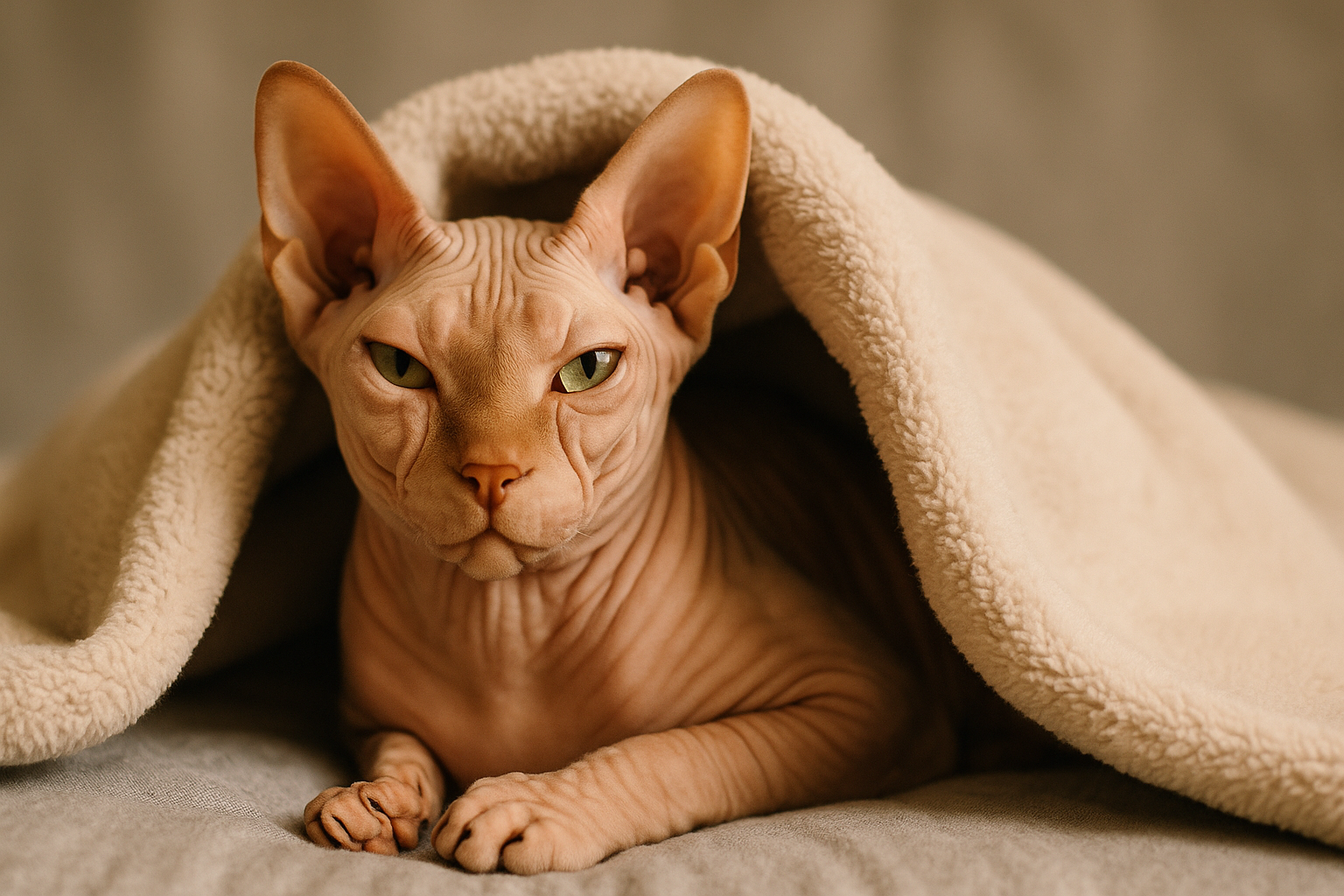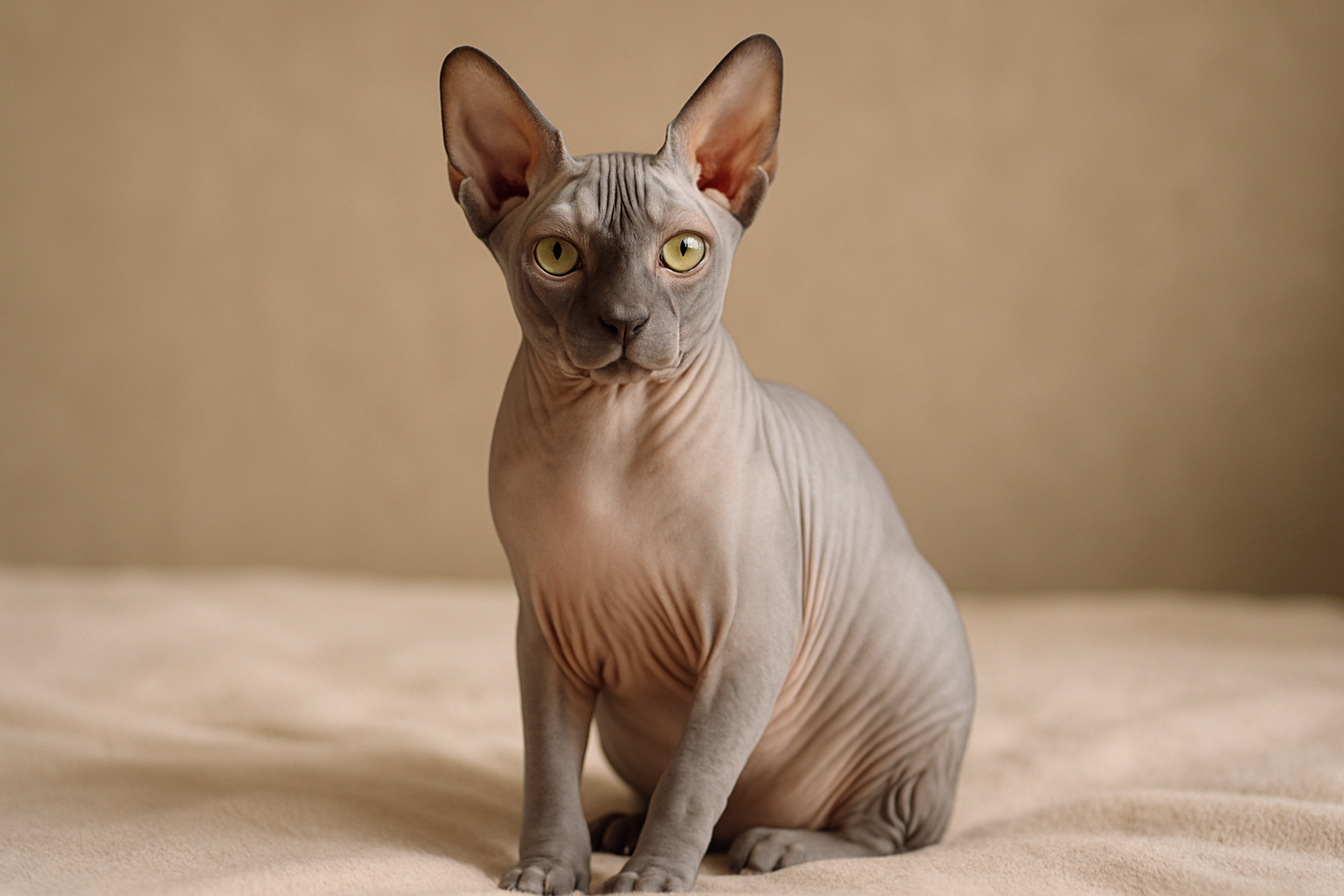The Sphynx Cat is one of the most recognizable and misunderstood breeds in the cat world. With its hairless body, oversized ears, and wrinkled skin, it might look otherworldly, but this breed is all heart. Known for being affectionate, playful, and just a little mischievous, the Sphynx thrives in homes where it can be the center of attention.
Don’t let the lack of fur fool you: these cats aren’t low-maintenance. In fact, Sphynx cat care requires some special attention, from skin upkeep to warmth and sun protection. But if you’re up for it, you’re getting a loyal, people-loving companion who will follow you from room to room and might even steal your blanket.
Quick Breed Facts
- Origin: Canada
- Breed registries: CFA, TICA, FIFe, ACFA
- Weight range: 6–12 pounds
- Lifespan: 9–15 years
- Coat: Hairless (fine peach fuzz may be present)
- Colors and patterns: All colors and patterns expressed through skin pigmentation
- Eye color: Varies; often vivid blue, green, gold, or hazel
- Grooming: Moderate; regular bathing required
- Activity level: High
- Affection level: Very high
- Vocality: Medium to high
- Good with children: Yes
- Good with other pets: Yes
History & Origin
The Sphynx cat originated in Canada in the 1960s, when a natural genetic mutation resulted in a hairless kitten. Breeders began selectively working with these hairless cats to create a stable breed. By the 1980s, the modern Sphynx emerged through careful outcrossing with Devon Rex and American Shorthair lines to improve health and diversity.
Despite its ancient Egyptian-sounding name, the Sphynx cat has no historical ties to the actual Sphinx. Its name was chosen purely because of its exotic, regal appearance.
Personality & Temperament
Prepare for a cat who wants to be involved in everything. Sphynx cats are incredibly outgoing, social, and attention-seeking. They often act more like dogs than cats, greeting guests, riding shoulders, and following you to the bathroom.

They love to cuddle (especially under the covers), and they hate being alone. If you’re gone often, a second cat or pet companion is ideal to keep them company.
Grooming & Shedding
It may seem strange, but hairless doesn’t mean maintenance-free. Sphynx cats produce skin oils just like any other cat, but without fur to absorb it, that oil builds up. Weekly baths are usually necessary to keep their skin clean and odor-free.
You’ll also need to gently clean their ears and folds regularly. While they don’t shed like furry breeds, you may notice oil stains on furniture or bedding if grooming is neglected.
Activity & Play
Sphynx cats are highly active and curious. They love exploring, climbing, and playing interactive games. Puzzle feeders, wand toys, and vertical shelves are great for keeping them stimulated both physically and mentally.
They’re also heat-seeking missiles, often found curled up in sunny windows or on warm laptops.
Health & Lifespan
On average, the Sphynx cat lifespan ranges from 9 to 15 years. While generally healthy, the breed can be prone to a few genetic conditions, including hypertrophic cardiomyopathy (HCM), periodontal disease, and skin infections.
Regular vet checkups, dental care, and attention to skin hygiene can go a long way in keeping your Sphynx healthy. And yes, they can get fleas, even without fur, so use prevention as you would for any other cat.
Recommended Supplies
Because of their unique needs, Sphynx cats benefit from a few specialized products. Alongside a litter box, scratching post, and high-quality food, consider warm beds, heated pads, and cozy hiding spots. Since they lack a fur coat, temperature control is especially important. Many owners invest in heated cat beds or keep extra fleece blankets around the house.
You may also want to stock up on gentle pet-safe wipes for in-between baths, soft sweaters for cooler weather, and sunscreen formulated for pets if your Sphynx enjoys sunbathing near windows. These cats love burrowing and nesting, so giving them a place to tuck themselves in is not just a luxury, it’s truly a necessity.
Family Compatibility
Sphynx cats are amazing family pets. They adore attention and usually do well with kids, dogs, and other cats. Their bold and friendly nature makes them ideal for lively households that have plenty of love and warmth to give.
They’re not a good match for people who want a low-touch or independent cat. This breed needs company, snuggles, and a little pampering to thrive.
Sphynx Cat FAQs
Are Sphynx cats hypoallergenic?
Not exactly. While they don’t shed fur, they still produce skin oils and dander—which are common allergens. Some allergy sufferers do better with this breed, but it depends on the person.
How much are Sphynx cats?
The Sphynx cat price can range from $1,500 to over $3,000 depending on the breeder, pedigree, and location. Rescue options are available too and may be more affordable.
Do Sphynx cats like water?
Surprisingly, many do! Because they need regular baths, many Sphynx cats get used to water early on and may even enjoy it. Warm water is key—no cold baths, please.
Do Sphynx cats have whiskers?
Some do, but many are born with either very short, curly whiskers or none at all. It’s completely normal for the breed.
Where can I find a Sphynx cat rescue?
Check out rescue organizations like Petfinder or breed-specific rescues such as Sphynx Rescue for adoptable cats in your area.
Final Thoughts
If you’re looking for a cat that will keep you warm, entertained, and constantly in good company, the Sphynx cat might just be your perfect match. With their big personalities, loving nature, and surprisingly high-maintenance skin, these hairless wonders are anything but ordinary.
Just be ready to offer them what they need: regular baths, cozy places to snuggle, and lots of attention. In return, you’ll get a devoted companion who’ll follow you from room to room and never miss a chance to curl up on your lap or your laptop.



